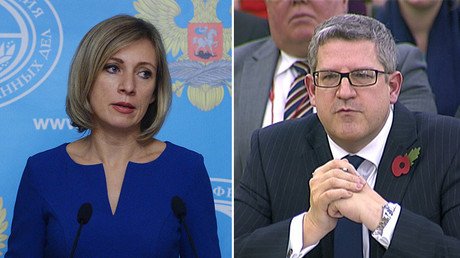'Witch hunt': Report urges UK to ‘map,’ ‘challenge,’ and expose public figures with Russia links
An influential right-wing think-tank has proposed a radical clampdown on politicians and other prominent figures sympathetic to Russia by “challenging their credibility,” revealing their “insidious means of funding,” and forcing them to reveal if they receive money for appearing on RT.
The new report, published by the Henry Jackson Society comes as the EU parliament prepares to debate how to resist "disinformation and propaganda" from Russia on Tuesday.
Called ‘Putin’s Useful Idiots,’ the 17-page document was written by Andrew Foxall, the Director of the Russia Studies Centre at the conservative think tank. Foxall said that “Putin makes for a deceptive and dangerous friend” for “those on the left who can be relied upon to stand up for the West’s enemies whoever and wherever they may be, and those on the right who see Moscow as a defender of conservative values.”
Among the examples on the right, are UKIP leader Nigel Farage, who has regularly appeared on RT for a decade, and Nick Griffin, the former BNP leader, who reportedly travels to Russia regularly to participate in nationalist conferences, and has said that he is open to funding from Russia for his anti-NATO activist group.
On the left, the report mentions the Stop the War coalition, which was once chaired by current Labour Party leader Jeremy Corbyn, and the Scottish independence movement.
Foxall, a former Oxford University lecturer, called Russia's supporters “tools in [the Kremlin’s] programme of active measures”. The report also takes aim at RT, Sputnik and other foreign-language Russian media, branding them the result of “heavy investment” from the Kremlin, aimed at “influencing European public opinion and improving its international image,” and even working as a means of funding Kremlin sympathizers.
“Many of those on the extremes of the political spectrum, particularly the left, have appeared on RT. If they received appearance fees, then they have also taken money from the Kremlin, thereby establishing financial links between themselves, their organisations and Moscow,” stated Foxall.
While the report said there is no “silver bullet” that could solve the “problem” of pro Russian opinion-makers, it suggested a list of comprehensive measures.
“Activists, journalists and politicians should point out the pro-Russian connections of individuals and parties on the left and right of the political spectrum and challenge the credibility of these entities via political debates,” said the author.
“The personal and organisational connections of left- and right-wing parties and their Russian counterparts should be mapped across Europe,” said Hoxall, claiming that Cold War-era KGB 'comrade networks' have either been resurrected or forged anew, to undermine the West.
“As movements on the left and right grow in influence across Europe, the continent must wake up to their insidious means of funding,” continues the report, suggesting that “Parliament should amend current legislation or pass new legislation that forces politicians to declare all media appearances they make, whether they receive money for them or not.”
'21st-century McCarthyism'
“I am shocked and appalled by this report – it is both dangerous and inflammatory. It should be condemned by anyone who believes in free speech” Marcus Papadopoulos, the editor of Politics First, a UK analytical magazine, told RT.
“In essence it says that any person who gives an interview to Russian media – including RT – is an ‘idiot’ and a traitor to Britain, and should be publicly named and shamed. It’s a witch hunt, and 21st-century McCarthyism.”
Annie Machon, a former UK intelligence officer, who has become a regular RT contributor, said she has experienced first-hand accusations of being a Kremlin "collaborationist."
“I appear on all sorts of different channels, including the BBC, which is state-funded. Most countries have their own publicly funded organizations and media, what is the problem?” she told RT from London.
“I think there is also a knee-jerk reaction by a UK and US-funded think tank against the election of Donald Trump. The establishment in both countries is worried that he might forge a more cordial relationship with Russia.”
The privately-funded Henry Jackson Society was founded in 2005 at Cambridge University in the UK, with the backing of prominent US neoconservatives such as William Kristol and former CIA chief James Woolsey. It says it maintains a bipartisan approach, and was officially involved with two key UK all-party parliamentary groups, but had to withdraw in 2014, after it refused to disclose its funding sources, in accordance with transparency rules.
“The Henry Jackson Society should be taken very seriously, and have some very good analysts,” said Martin McCauley, a historian and political analyst, who added it was “standard practice” for contributors to receive fees on all UK news channels.
“What this report means is that the Russian narrative is very effective, if it weren’t, it would just be ignored.”













